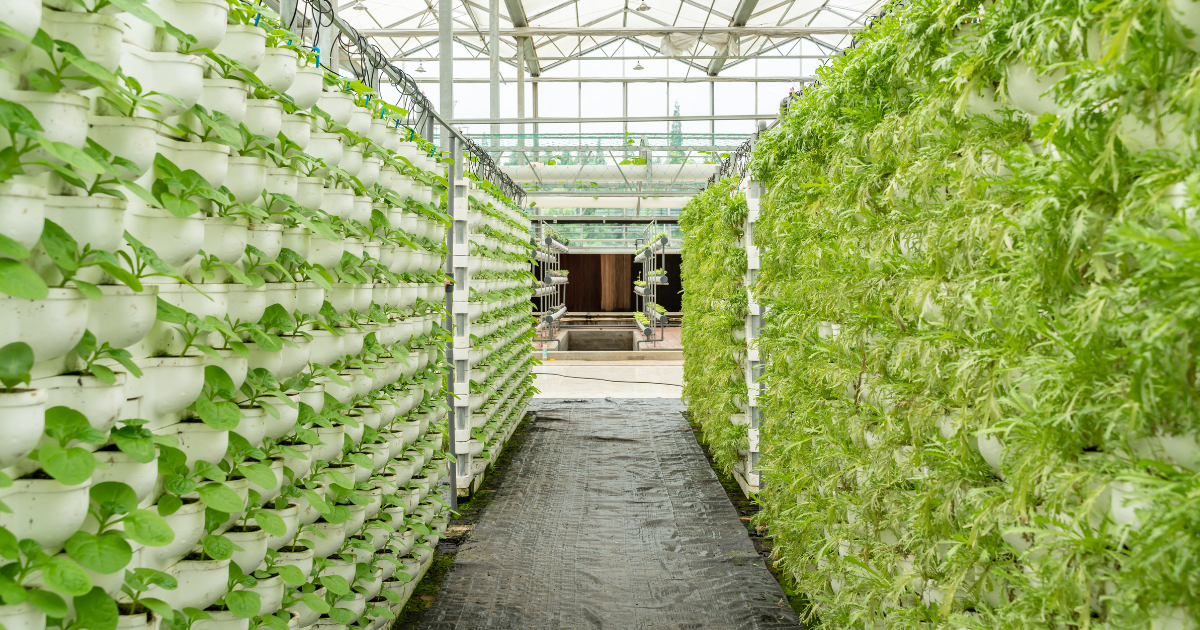How Vertical Farming Will Change Agriculture

Have you seen tomatoes growing upside down on a vertical farm? Vertical farming is the new and improved way to combat water scarcity challenges. Welcome to the greenhouse revolution, vertical farming! Since the early 2000s, vertical farming has transformed agriculture with people and the planet in mind. This way of farming has numerous benefits, including higher productivity, lower water use, and improved taste! Vertical farming has solutions to our ever-growing demand for crop yield and limited space.
Introducing Vertical Farms
A sophisticated agriculture platform that combines artificial intelligence and plant biology to deliver superior products distributed locally and globally. According to Nature.com, the global demand for food continues to increase by 35% to 56% between 2010 and 2050. A vision into the future, vertical farming is here to contribute to a more comprehensive solution to solving world problems. With the rise in food demand, how do we combat global hunger when land resources are limited? The solution; vertical farming.
Revolutionary Technology
Vertical farming uses cutting-edge artificial intelligence (AI) technology and plant biology to solve agriculture’s biggest challenges. These technologies optimize production by combining engineering and food science, which gives us a distinct capability to understand plant biology.
What is vertical farming? Just as it sounds, vertical farming is the agricultural process where crops are grown in a perpendicular formation rather than in traditional, horizontal rows. When growing vertically, space is conserved, which results in higher crop yield per the land used. Most conventional farming practices involve acres of land; in contrast, vertical farms are located indoors in controlled environments. Since vertical farming does not require soil, therefore there is no need to be confined to a geographic location. Geographic location is not the only limiting factor of traditional farming; seasonal variations in temperature and sunlight determine the growing cycles.
Higher Productivity
When there is a controlled environment and fewer resources wasted, vertical farming has figured out a way to grow with 95% less water, up to 99% less land, zero pesticides, and a fraction of the fertilizers compared to field farming while maximizing output. How we grow our crops could determine the increase or decrease of the demand for productivity.
Lower Water Use
Days are getting hotter, and the air is getting thirstier. The severity of drought continues to increase. As soon as water contacts the ground, some of it evaporates, essentially it is wasted. The Nevada Irrigation District continues to monitor conditions so that a supply of water is balanced and used efficiently by agriculture.
Vertical farms may be the future; they save massive amounts of water from waste yearly through different systems and practices.
Not only is water not evaporated in vertical farming, but water is recycled. It is filtered, processed, and used to feed the plants.
Improved Food Taste
Vertical farming is a unique way to grow crops and yield results that are essentially perfect. With the ability to control and create ideal conditions, plants can thrive. Vertical farming tailors to the different pieces of the equation like lights, nutrients, and other unique stressors that allow us to grow flavorful produce. Not only will the crops yield flavor, but food safety also provides farm credibility.
Vertical Farming Impacts on Water Conservation
The impacts of climate change are harmful to water conservation efforts. According to the United States Environmental Protection Agency, the U.S. population has doubled over the past 50 years, while our use of water has tripled. Vertical farming uses less water to produce more crops. The demand for food is on the rise, but the means to grow is diminishing. The Nevada Irrigation District strives to provide better information on how to stay sustainable and conserve water.
Vertical farms combine technology and plant biology growing without needing soil. Growing traditional crops uses more water per crop due to evaporation and soil inefficiency. Vertical farming technology could use 90% less water if conventional farms converted to the more modern vertical farming methods.
Water for Life
Water is essential to life. The Nevada Irrigation District calls for customers to conserve more and protect water resources. The Plan For Water Initiative focuses on analyzing risk and mitigation efforts related to environmental and operational considerations.
Learn more about agriculture's impacts on water conservation and what the Nevada Irrigation District is doing to help the environment.
